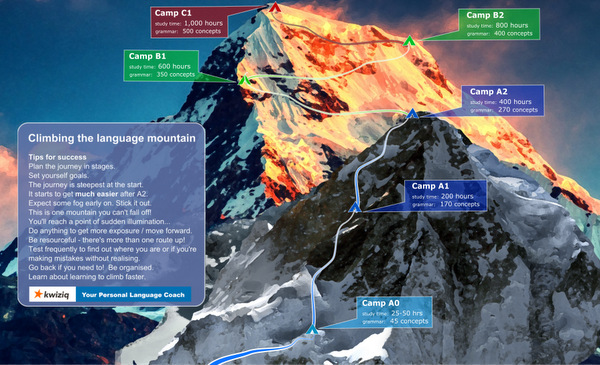Think of learning a language a bit like climbing a mountain: a tall but not-too-steep mountain, one that someone of any fitness level can climb as long as they don't give up. The first part is the hardest: it's all just cloud cover, fog, bad weather, and slog. Somewhere between CEFR levels A2 and B1* there's a moment you break through to sunshine and finally see the amazing vistas that only learning another language can give you.

This is what most teachers won't tell you: when you're learning your first foreign language, it will take approximately 600 hours of study and practice to reach intermediate (B1) level. So if your class only meets for an hour a week and you don't do any studying or practice beyond that, it can take 15 years to reach that level! (And that's assuming that you remember everything you learn during those hourly classes, which is extremely unlikely.) This is why many students suffer "language shock" when they visit a foreign country for the first time and discover that, despite months or even years of casual study, they can barely order in a restaurant, much less carry on a conversation.
On the other hand, if you dive into full-time language study, with 40 hours a week, you'll reach 600 study hours in just 15 weeks - less than four months!
Of course, these are just estimates and guidelines, but as you can see, the amount of study time has a direct and substantial impact on how long it might take you to arrive at level B1. Realistically, you'll want to aim for something between one and 40 hours a week and then do the math from there to see approximately how long it might take you to arrive at that level. And remember that you'll need to double that estimate for "near-native speaker" level C2.
The Bottom Line
You need to be realistic about how much effort is required to reach whatever level of proficiency you're after, and how much time you're willing to put toward that objective. Understanding this when you start out will help prevent demotivation and frustration. Learning a language like French is more a matter of racking up study hours than anything else. Your native ability is secondary. Yes, some people will learn faster or slower but given enough time, everyone can become fluent. Language learning isn't hard, per se, but it takes a lot of time, whether or not you have a "knack" for languages. There's a massive amount to learn, and you need to be in the mindset of climbing a mountain or running a marathon, rather than sprinting. Knowing what to expect is a vital part of managing your own expectations so that you don't sabotage your learning with self-deprecating stories about your capabilities (see Language learning myths).
* CEFR is the European language proficiency standard. To find out where you are on this journey, take our French CEFR test.
